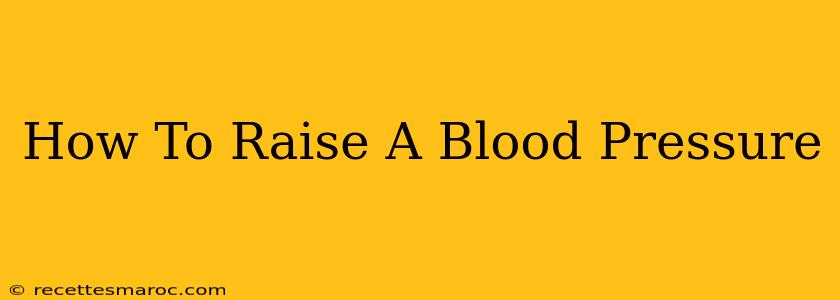Low blood pressure, or hypotension, can leave you feeling fatigued, dizzy, and even faint. While it's often harmless, understanding how to raise blood pressure safely and effectively is crucial for maintaining your well-being. This comprehensive guide explores various methods, from lifestyle changes to medical interventions, empowering you to manage your blood pressure effectively.
Understanding Low Blood Pressure
Before diving into solutions, it's essential to understand the underlying causes of low blood pressure. Hypotension can stem from various factors, including:
- Dehydration: Insufficient fluid intake can lead to decreased blood volume, resulting in lower blood pressure.
- Medication Side Effects: Certain medications, such as diuretics and some heart medications, can lower blood pressure.
- Underlying Medical Conditions: Conditions like heart problems, endocrine disorders (such as Addison's disease), and nutritional deficiencies can contribute to hypotension.
- Dietary Factors: A diet lacking in essential nutrients can impact blood pressure regulation.
It's crucial to consult a doctor to determine the root cause of your low blood pressure before attempting any remedies. Self-treating can be dangerous.
Natural Ways to Raise Blood Pressure
For those with mild, lifestyle-related hypotension, several natural methods can help:
1. Increase Fluid Intake
Hydration is key. Dehydration is a common cause of low blood pressure. Drinking plenty of water, broth, or electrolyte-rich drinks throughout the day can significantly improve blood volume and, consequently, blood pressure.
2. Dietary Adjustments
- Increase Salt Intake (Moderately): While excessive salt intake is generally discouraged, a slight increase under medical supervision might be beneficial for some individuals with low blood pressure. Consult your doctor before making any significant changes to your salt intake.
- Eat More Sodium-Rich Foods: Include foods naturally rich in sodium, such as processed meats (in moderation), canned soups, and salty snacks (again, in moderation). Focus on a balanced diet overall.
- Consume More Protein: Protein-rich foods help maintain blood volume. Include lean meats, poultry, fish, eggs, beans, and lentils in your diet.
3. Lifestyle Modifications
- Increase Physical Activity: Regular exercise, especially strength training, can help strengthen the heart and improve blood circulation. Start gradually and consult your doctor before beginning any new exercise regimen.
- Elevate Your Legs: Elevating your legs above your heart when resting can improve blood flow back to the heart.
- Reduce Stress: Stress can significantly impact blood pressure. Practice relaxation techniques like deep breathing, meditation, or yoga to manage stress levels.
4. Compression Stockings
Compression stockings can help improve blood circulation in the legs and improve blood return to the heart, potentially helping to raise blood pressure.
Medical Interventions
In cases of severe or chronic hypotension, medical intervention might be necessary. Your doctor may prescribe medication or suggest other treatments, such as:
- Medication: Your doctor might prescribe medications like fludrocortisone or midodrine, which help raise blood pressure.
- Underlying Condition Treatment: If an underlying medical condition is causing your low blood pressure, addressing that condition is crucial.
When to See a Doctor
It's important to seek medical attention if you experience:
- Dizziness or Fainting: These are significant symptoms that warrant immediate medical attention.
- Blurred Vision: Changes in vision can indicate a problem with blood pressure regulation.
- Chest Pain: Chest pain should always be evaluated by a healthcare professional.
- Shortness of Breath: Difficulty breathing could be related to underlying health issues impacting blood pressure.
Disclaimer: This information is intended for educational purposes only and should not be considered medical advice. Always consult your doctor before making any changes to your diet, lifestyle, or medication regimen. Proper diagnosis and treatment are crucial for managing low blood pressure effectively and safely. Self-treating can be dangerous. Seek professional medical help for personalized guidance.

